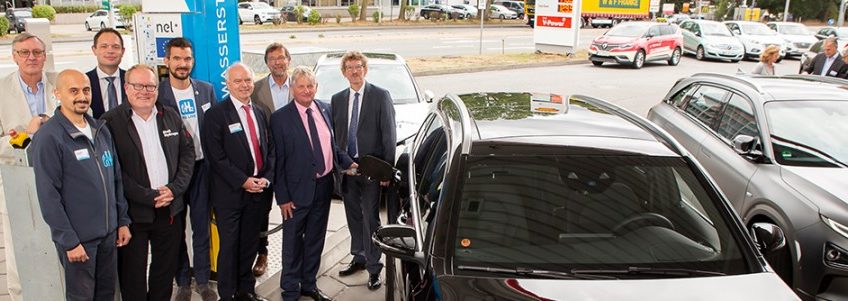H2 MOBILITY joint venture inaugurates another H2 station Fuel-cell vehicles can now refuel at the Shell Autohof Stuhr - Groß Mackenstedt rest stop European Commission funds the facility
31 August 2018, Stuhr – H2 MOBILITY Deutschland, Shell, and Nel today opened Lower Saxony’s second hydrogen (H2) station. In commissioning the station at the Shell Autohof Stuhr – Groß Mackenstedt rest stop, the partners are taking a further step towards establishing a nationwide H2 supply network in Germany.
The rest stop is located directly at the Stuhr junction on the BAB 1 motorway, or the Groß Mackenstedt exit on the BAB 28 – in the Bremen/Delmenhorst/Oldenburg catchment area. Drivers of emissions-free fuel-cell cars now have another refuelling option on the important northwest axis between Hamburg and the Ruhr region.
The owner and operator of the new H2 station at the Shell rest stop is the H2 MOBILITY joint venture. The filling-station technology is by Nel. The hydrogen station is state of the art, and its driver-side operation is intuitive; the refuelling process is similar to that of conventional vehicles and can be completed in three to five minutes. The facility holds around 170 kilograms of hydrogen – enough to refuel 30 to 40 vehicles a day.
Hydrogen e-mobility reduces CO2 emissions
Hydrogen offers a way to expand the range of fuels in the transport sector in a climate-friendly way: Hydrogen produced with renewable energy can significantly reduce climate-damaging CO2 emissions. The operation of an H2-powered fuel-cell vehicle causes neither local pollutants nor carbon dioxide (CO2) emissions. Such vehicles currently have a range of 500 to 800 kilometres on a full tank of fuel.
Ensuring that hydrogen-powered electric mobility becomes a success story requires an attractive range of fuel-cell vehicles in conjunction with an appropriate supply infrastructure. The expansion of the network of filling stations is making good progress. A Germany-wide network of 100 stations is to be established by 2019. With the addition of Stuhr Groß Mackenstedt, it is now possible to refuel at 45 stations across Germany.
The European Commission is funding a total of 17 facilities in the ‘trans-European Transport Network (TEN-T CEF)’, including the Stuhr station, with a total of 11 million euros, through its ‘Connecting Hydrogen Refuelling Stations’ (COHRS) project.
The parties involved comment on the opening of the Stuhr – Groß Mackenstedt H2 station:
Thomas Zengerly, Chairman & CEO, Shell Deutschland Oil GmbH:
“Hydrogen technology is a promising way forward, and hydrogen a fuel that lends itself for clean mobility. We expect that this alternative drive will play an increasingly important role in markets such as Germany, England, Benelux, the USA, and Japan from the 2020s onwards. At Shell, we are on course for this development.
Nikolas Iwan, Managing Director, H2 MOBILITY Deutschland GmbH:
“Germany is on its way to becoming a trailblazer in the field of hydrogen-powered electromobility. We are currently building the backbone of the hydrogen infrastructure with the first 100 stations in metropolitan areas as well as along highways and motorways. We are basing the expansion of this network on demand.”
Frank Doods, State Secretary at Lower Saxony’s Ministry of the Environment, Energy, Building and Climate Protection:
“It is time to reduce greenhouse gases in the transport sector too. I assume that battery-powered solutions can meet many, but certainly not all mobility requirements in this way. That’s why we also need the option of fuel-cell-powered electric drives.”
Ulf Schmidt, Deputy District Administrator, Diepholz District:
“From now on, many drivers will refuel their hydrogen vehicles in our district when travelling from northern to western Germany – we’re proud of this, and it strengthens us as a mobility region/centre in northern Germany.”
Niels Thomsen, Mayor of Stuhr:
“Hydrogen and fuel-cell vehicles contribute to the success of the energy transition, including in the mobility sector. This new offer further strengthens Stuhr as a place of business.”


